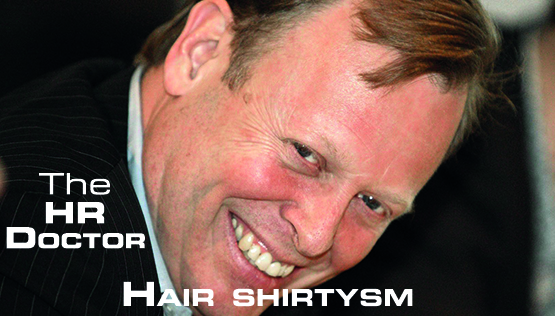 09.09.2020
09.09.2020
The HR Doctor 10: Hair shirtysm
Af Nick Holley, Associate Director of Learning, Corporate Research Forum
|
Nick Holley er Keynote på Træfpunkt HR 2020 online, hvor han deler ud af sine diagnoser over de 10 ”sygdomme”, som han har set HR lide af i de 30 år, han har fungeret som praktiker, researcher, underviser og konsulent. Kan du genkende dem? Som optakt til Keynoten sætter vi fokus på de 10 sygdomme i ugerne op til Træfpunkt HR. |
The dictionary defines a hair shirt as ‘a shirt made of rough uncomfortable cloth which some religious people used to wear to punish themselves’. The analogy with HR is the person who complains about what is bad or punishes themselves, rather than doing something about it. If you aren’t influential become influential. If you’re not respected understand what drives respect with your key stakeholders and deliver it. But don’t beat yourself up or whinge about it, do something about it.
Symptoms
- HR people who suffer from this final disease are some of the most pitiful patients. They spend their whole time asking why they don’t have a seat at the table rather than actually doing things that add value; establishing their credibility so no one doubts their place.
- They endlessly gaze at their own navel wondering why no one respects them, rather than getting out there and listening to their customers – what are their challenges, what are the people implications, what do they need from HR and how does this match with what they are currently delivering?
- The problem is they become delusional - thinking it’s more fun to whinge about it than actually do something about it. This can lead to a mental disorder known as projection where the patient projects his or her own shortcomings onto the business. Often they blame the business because it ‘doesn’t get HR’ or ‘they don’t have a seat at the table’ and go off to another organisation where their lack of credibility manifests itself in the same way.
- One of the key symptoms is the patient becomes increasingly frustrated by their lack of credibility. They become impatient: if they keep it to themselves that’s fine, but often they show their impatience and frustration to others evoking the same reaction in them.
- One word of warning; this is a highly contagious disease. Patients can often be found roaming HR conferences in large groups winding each other up and spreading their infection to young vulnerable (but healthy) HR professionals undermining not only themselves but also HR in general.
Impact
Of all the diseases I have diagnosed, I would argue this one leads to the most professional suicides. People who suffer from hair shirtysm develop a reputation for being emotional hoovers (perhaps I should say Nilfisk in Denmark?), whingers who suck the energy out of everyone else. At best people avoid them, at worst they offer them the chance to carry on their whinging somewhere else.
Example
One of the best HR Directors I know was offered the chance to take on her first country level HRD role, but the role wasn’t on the executive team. Even so she decided to take it. I was chatting to her boss a few months after she’d joined. He’d been having coffee with her and observed that in his executive meetings she made the best contributions. It suddenly dawned on him that she wasn’t actually on his executive so how come she was always in the meetings. Her reply was there were critical issues being discussed that needed her contribution (BTW she had analysed the agendas and made sure she contributed to every issue not just the people related ones) so she had invited herself. His response was well we’d better formalise this. The point is she didn’t whinge about it, she didn’t even ask permission, she simply behaved as a member of his executive so no one doubted she should be one.
Cures
- To get a seat at the table means behaving as a member of the top leadership team, focusing on the business issues not only from an HR perspective but also from a broader commercial perspective. In talking about his business partners one line manager said: “I invite their opinion outside their domain, then it really clicks, they’re a well-rounded business professional whose opinion I value on all things”.
- Recognise that the more you ask for a seat at the table the less likely it is that you’ll get one. If you want a seat, take your hair shirt off and focus on building your personal credibility.
- Work with the organisation to understand its needs. Drive your agenda out of their agenda. In the short term it might mean compromising but remember that the long game is usually the quickest way to get somewhere.
- Very few people are as passionate about HR as you are. Why should they be? The danger is you are drawn to the ones that do share your passion rather than the ones with the power and the influence. Identify who has the power and impact and recognise they are more concerned with themselves than with you.
- This all might sound Machiavellian, but we have to recognise that business is populated by more Machiavellis then Mother Theresas. Of course, HR must be the moral compass for the business, but if you want to play the game you have to understand the rules of the game and engage with it - not sit on the touchlines whinging.
Læs også
- The HR Doctor 1: Disconnection disorder
- The HR Doctor 2: Delivery deficiency
- The HR Doctor 3: Initiativitis
- The HR Doctor 4: Compartmentalisation
- The HR Doctor 5: Dominance Pathology
- The HR Doctor 6: Easy Way Outosis
- The HR Doctor 7: Lack of depth malady
- The HR Doctor 8: Me-me-me syndrome
- The HR Doctor 9: Action paralysis